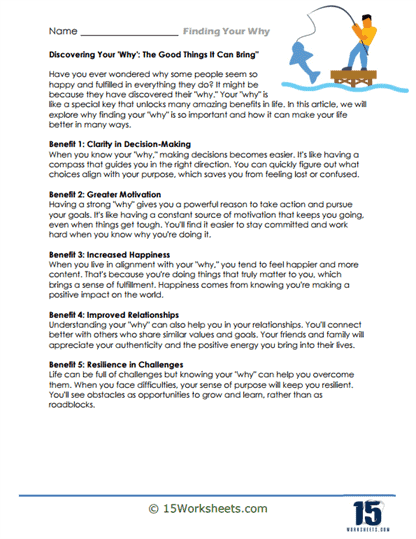Finding Your Why Worksheets
About These 15 Worksheets
These worksheets are introspective tools designed to assist individuals in discovering their personal motivations, values, and purposes in life. These worksheets guide users through a series of reflective exercises and questions, encouraging deep self-exploration and leading to clarity about personal goals and aspirations. The process of completing these worksheets can be profoundly transformative, offering insights that help individuals align their actions with their true desires and values. These worksheets are not just for personal introspection; they are also used in educational settings to help students understand their motivations and build a future that resonates with their core values.
They guide students through a journey of self-discovery, helping them to uncover their deepest values, motivations, and aspirations. This understanding empowers students to lead purpose-driven lives, marked by clarity, resilience, and fulfillment. Through this process, they not only realize their potential but also contribute positively to the world, driven by a clear and compelling ‘why.’
Types of Exercises
One common type of exercise in these worksheets involves reflection questions. These are open-ended questions designed to prompt deep thinking about one’s experiences, values, and aspirations. Questions like “What activities make you lose track of time?” or “When have you felt the most fulfilled?” encourage individuals to reflect on moments in their life when they felt truly engaged and satisfied, pointing towards areas of passion and interest.
Another typical exercise is the visualization task. Here, individuals are guided to envision their ideal life in detail, including their career, relationships, and personal achievements. This exercise helps to clarify one’s aspirations and serves as a motivator by creating a vivid mental image of one’s goals. It’s based on the principle that you can’t achieve what you can’t clearly conceive.
Life mapping is another powerful exercise found in these worksheets. Participants plot out significant life events, both positive and negative, and reflect on the lessons learned from these experiences. This exercise helps individuals to see patterns in their life choices and understand how their past has shaped their current values and future aspirations. It can also highlight strengths and resilience, showing how challenges were overcome, which can be a source of motivation and self-confidence.
Value identification exercises are also a key component of these worksheets. Participants are provided with a list of values and asked to select those that resonate most with them. Reflecting on why these values are important helps to clarify what truly matters to the individual, guiding decision-making and goal setting. It’s a process of discerning one’s inner compass, ensuring that the path they choose is aligned with their deepest beliefs and principles.
Goal setting exercises in these worksheets are not just about setting arbitrary objectives. They focus on setting ‘intentional’ goals that resonate with one’s values and envisioned future. These goals are then broken down into actionable steps, making the journey towards them clear and manageable. This not only empowers individuals to take control of their life direction but also ensures that the goals they pursue are meaningful and fulfilling.
Journaling prompts are another common feature. These prompts encourage regular reflection, allowing individuals to track their progress, work through challenges, and celebrate achievements. This ongoing process of reflection ensures that individuals remain connected to their ‘why’ and can make adjustments to their path as they grow and evolve.
Some worksheets include group activities or discussions, especially in educational settings. These activities encourage sharing insights and experiences with peers, offering different perspectives and fostering a supportive environment where individuals can discuss their aspirations and challenges openly. This collaborative aspect can be incredibly enriching, as it allows individuals to learn from the experiences and viewpoints of others.
The Benefits
Understanding one’s ‘why’ provides a sense of direction and clarity. Students who are clear about their motivations and goals are more likely to pursue their studies and careers with purpose and determination. They see their education not just as a requirement but as a step towards their larger goals, which can significantly enhance their engagement and performance.
This clarity of purpose can lead to improved decision-making. When students understand their values and what they truly want to achieve, they can make choices that align with their goals, from selecting their courses and extracurricular activities to choosing their career paths. This alignment ensures that they invest their time and energy in pursuits that are truly meaningful to them, leading to greater satisfaction and success.
Understanding one’s ‘why’ fosters resilience. Students who have a clear sense of purpose are better equipped to face challenges and setbacks. They understand that obstacles are part of the journey and can stay focused on their long-term goals, using their ‘why’ as a source of motivation and perseverance.
These worksheets encourage a mindset of growth and self-improvement. By regularly reflecting on their goals, values, and experiences, students are engaged in a continuous process of learning and development. They become proactive about seeking opportunities for growth and are open to feedback and new experiences, seeing them as chances to move closer to their life’s purpose.
The series of worksheets, above, can foster a sense of fulfillment and well-being. Students who are engaged in pursuits that resonate with their core values and goals experience a greater sense of satisfaction and happiness. They understand that their efforts are contributing to something meaningful, which is a powerful source of intrinsic motivation and joy.


















